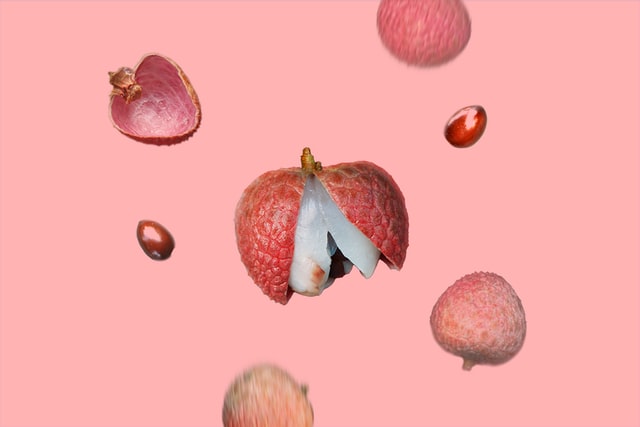Lychee, a delicious tropical fruit native to China, has a slightly sour flavor and is rich in vitamin C, as well as other vitamins and minerals. Read on to learn more about dogs and lychees. If your dog is an apple-loving type, and you want to know, “Can dogs eat lychee?”, “Is Lychee Safe For Dogs?” or “ What are the Health Benefits of Lychee?” then read this guide to find out your all answers.

What Is Lychee Fruit?
Lychee is an exotic fruit that belongs to the soapberry family.
The Chinese are the main producers of lychees. India is a minor producer but the country is still home to the largest concentration of people who consume lychees.
But these fruits also grow in tropical and subtropical areas around the world, including Vietnam, South Africa, Pakistan, Mexico, and parts of the United States. Ripe lychees have pink or reddish-brown leathery skin and are round-shaped, resembling a bumpy-looking strawberry.
The white, sweet-tart flesh inside the fruit is the edible part of the lychee and tastes like a mixture of grape and pear.
Can Dogs Have Lychee?

Lychees are a type of berry. Lychees are eaten both fresh and canned. Lychees are extremely nutritious. Fiber is a type of carbohydrate. Vitamin E, which is needed for normal vision and for keeping our eyes healthy, is also found in lychees. Lychees are low-calorie fruits so they are especially suitable for diets where a person needs to lose weight or wants to keep the weight off.
While lychee fruit is a delicious tropical treat that contains high-energy carbohydrates, it can also cause your dog to develop kidney stones if not properly monitored.
So, what’s the best way to feed your dog? Always do your homework before you give them anything that you wouldn’t give your own children.
There is no reliable information available on feeding lychee to dogs. However, you can make a healthy treat by giving your dog some lychee flesh with the seed removed.
Are Lychees Good For Dogs?
Yes, eating too many lychees is harmful to us, and if you take that same advice for your dog it will lead to problems as well. It is important to understand that just like us, dogs are individuals. What’s good for one is not good for another.
Dogs need more than just their regular dog food. Their diets must provide them with proper nutrition so that they are healthy and don’t become overweight.
In fact, dogs who eat a diet made from fresh fruits and vegetables are better able to maintain a healthy weight. Lychee, on the other hand, is a sweet fruit and can cause some dogs to gain weight.
There are several reasons why it is important to feed your dog in moderation. If you feed your dog too much, it can result in weight gain, or even diabetes, which can lead to other health problems in the long term. Sugary foods can also cause upset stomachs.
Lychees are a good option if you want to feed your dog, but be sure to avoid feeding them raw or even dried-out ones. Raw lychee can contain salmonella, which is why it’s important to buy canned lychee.
What Are the Health Benefits of Lychee for Dogs
Here are some health benefits of lychee for your dog:
- Did you know that lychee fruits can be nutritious in moderation? If your dog or cat loves them, you can serve them up as a snack. A 100 gram serving of raw lychee fruits.
- Contains modest amounts of potassium, phosphorus, iron, copper, and manganese. (source: USDA)
With over 100 mg of vitamin C per medium-sized serving, oranges are one of the most nutrient-rich fruits you can get your hands on. Your dog will appreciate it as well since this is a fruit that’s high in antioxidants and other nutrients that are good for your pooch’s health.
Vitamin C is an essential nutrient found in foods of plant origin, and it is also an important antioxidant. The main sources of vitamin C are fruits, vegetables, and berries, though they can be found in a variety of other sources. These foods are also extremely helpful for dogs and should make up a part of their daily diet.
The AKC also talks about the importance of the B vitamins for your dog’s metabolism, enzyme function, hormone regulation, and more. Lychee’s protein can help muscles, hair, and skin stay healthy.
The Fiber in fruits and vegetables is good for your pet’s digestive system. Meanwhile, the minerals in the fruit and vegetables are good for muscle and nerve function.
Are Lychees Dangerous To Dogs?
In addition to the lychee seeds themselves, the only other thing we know about them with a certain degree of certainty is that they are safe in small quantities for dogs. Some dogs may be sensitive to them, and if they are sensitive, they may be more likely to develop diarrhea, vomiting, or an upset stomach. So it’s important to keep an eye on your dog and watch for symptoms when you give them lychees.
They’re packed with fiber, which makes them great for cleansing and digestion. However, if your dog experiences an upset stomach after consuming lychees, make sure to tell your vet right away.
How Many Lychees Can Your Dog Eat?

According to This Study, Treats and snacks should comprise no more than 10% of your dog’s daily calories. But that accounts not just for lychee but for all treats and snacks your dog eats on a given day. This is true, but it would be wrong to assume that any of these treats are completely off-limits because they account for so little of your dog’s daily calories.
A good amount of sugar in the diet is between 20 and 50 grams per day for adult dogs. This is a healthy balance in the dog’s diet, although many of the dogs that eat this amount develop diabetes. A healthier alternative is to reduce the amount of sugar in the diet. Here are more helpful articles on Strawberry Yogurt and Acai Fruit.
Can a Dog Be Allergic to Lychee?
When introducing any new foods into your dog’s diet, you should watch out for any reactions to the new food. The most common reaction to lychee would be an upset stomach. You should also keep your eyes open for symptoms such as itchy ears or itchy paws, swelling in the face or mouth area, or hives on the skin. Those could all be signs of a lychee allergy.
Can Dogs Eat Unripe Lychee?
Lychees are safe to eat in their fully ripe state. However, if they aren’t ripe, then you need to give them away. Lychee fruit will not be suitable for your dog to eat.
If you don’t want your dog to eat something toxic, always look first at the nutritional facts. Always check the expiration date and make sure you are getting the highest quality food for your pet. It’s better to know now than to discover it was poisoned and have it make your dog sick.
Can Dogs Eat Lychee Nuts?
The lychee fruit, also known as the lychee nut, is safe for your dog in small quantities. Since the lychee fruit contains vitamin A, you should avoid giving it to your dog unless your veterinarian approves it.
If your dog has had a history of reacting negatively to lychee fruits, then you should cut back on his/her intake. Once you stop feeding it, the reaction will diminish.
Can Dogs Eat Lychee Jelly?
Lychee jelly is delicious and has been used for centuries to treat a number of conditions, but this sweet treat has some serious health implications for dogs. When the dog eats too much sugary food, it could lead to weight gain and other health problems like heart disease and diabetes.
Sugary foods usually contain more than 100 calories per serving but are low in fiber and other nutrients. If you give your dog some sweet treats made with fruits or jellies, make sure you are giving them some of the real food that’s naturally nutritious as well.
Can Dogs Eat Lychee Pits?
Is it OK for dogs to eat lychee seeds or pits? The lychee pits should not be eaten by dogs. The pit is toxic to dogs, as they contain a chemical called amygdalin. This causes an extreme reaction in dogs’ digestive systems.
Remove the pit first before you give your dog any of the fruit. This will prevent the animal from getting sick.
Conclusion About “Can Dogs Eat Lychee?”
Lychee is an exotic fruit that is rich in vitamins and minerals. However, it is a very rare treat for dogs to consume.
The idea of lychee has intrigued the minds of many dog owners over the years, and some even make lychees as treats for their pets. But before giving it to your dog, it is important to consider a few things. First off, is it safe for your dog to eat? If it is, how much is safe? Is it something you would want to do? In other words, are you willing to risk it?
Be sure to talk to your vet before giving any type of exotic food to your dog.
The best way to approach feeding your dog is to stick with a small amount at first and keep an eye on your dog for any negative reaction. If they don’t show signs of suffering after eating a little bit, slowly increase the amount and see what happens. You should contact your veterinarian immediately if your dog develops any kind of sickness or is acting in an unusual way after eating lychee fruit.
Related Articles:





